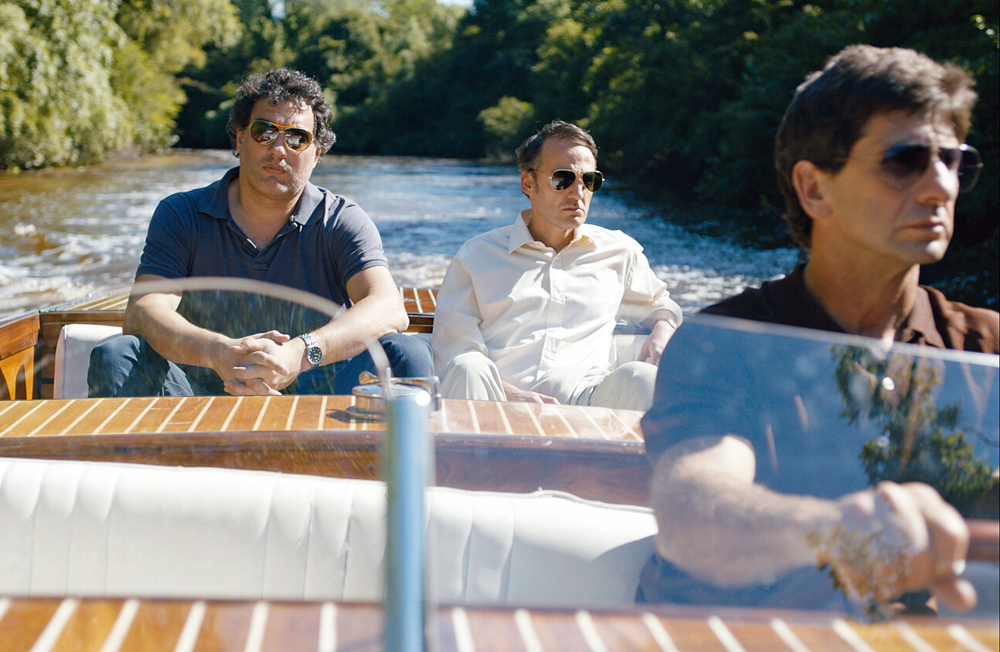There is a changing of the guard in “Azor,” Andreas Fontana’s crafty thriller of the soul as a Swiss banker Yvan (Fabrizio Rongione) and his wife Inés (Stéphanie Cléau) travel to Argentina in the early 1980s to assure wealthy clients that their money remains in safe hands as the country is in the throes of a military dictatorship. Dissenters are disappearing left and right, including quite possibly Yvan’s predecessor René, who has gone missing without a trace, and while Yvan visits the playgrounds of those don’t have a care in the world, attempting to talk shop at racetracks, private clubs and poolside bars, he is left to not only wonder about where his colleague ended up, but himself as well when he isn’t merely moving money for those he’s serving but increasingly it seems the evidence of great atrocities that have kept his clients flush.
The rate at which this realization takes hold is masterfully navigated by Fontana in his feature debut, working from an intricate script he co-wrote with Mariano Llinás, director of the recent cinematic event “La Flor.” After interviewing a number of journalists, academics, lawyers and bankers from the era, the director shows how reality begins to warp for Yvan, whose trips to palm tree-enshrouded environs start to appear as if he’s gotten lost in the jungle and the sharp-dressed men in front of him start to look like beasts underneath. While a premiere at this year’s Berlinale may not have drawn as much attention as it would’ve in a year without a global pandemic continuing to rage on, the film became an international sensation nonetheless, establishing Fontana as a major filmmaker to watch and with “Azor” starting its theatrical run this week en route to a home on the streamer MUBI, he spoke about how he crafted such a beguiling mystery, his personal connection to the material and how he mixed truth and fiction throughout the filmmaking process.
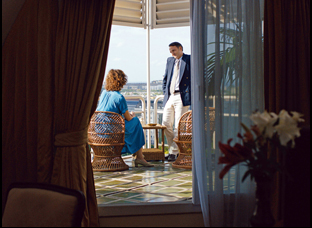
Yes, I was interested first in banking because my grandfather was a private banker, so I thought it was interesting territory to do a movie and then when I was living in Argentina for a long time, I tried to cross those two experiences – Swiss Bank and Argentina, and I discovered something quite strong [in the] attitude in Argentina during the dictatorship, so when I discovered that, I found some different court cases and I thought it was interesting because it was not just a few bankers going there by their own initiative, it was like more a system of doing business.
I was working in two directions in the same time, [doing] research about the banks and Argentina, clients, and dictatorship and of course, I realized it was completely linked — this material with colonialism, and it was quite easy to take some simple reference for a narrative [like] “Heart of Darkness” by Joseph Conrad, which was a kind of travel into the history of colonialism, so for me it was very natural to go in this way because it’s a completely irreverent way to do it.
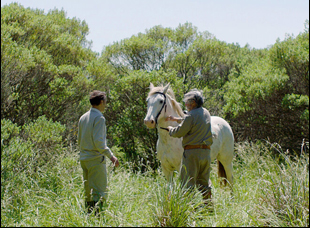
Mariano Llinas was very important for me in terms of meeting and also in terms of exposition because he’s a very [concerned with] exposition, but it was like a chess game. I was writing something and I sent it to him and he was saying, “No, it has to be like that,” and I said, “Well, let’s try…” So more it was this kind of work, but then I have to say that I’ve been working a lot alone on this script, so the main reference for the work was my own experience of traveling in Argentina and meeting those real clients of private banks. I’d been researching for two-years-and-a-half [years], meeting clients and bankers, and most often I [wouldn’t be able to say] all the truth, so I was as ambiguous as them [because] it’s impossible to go to a [typically] out-of-reach man with a lot of power and say to him, “I’m going to make a movie about a Swiss banker in Argentina during the dictatorship.”
You have to manage to say something a little bit interesting for him, but not the truth. In Argentina, it’s not completely easy even now to speak about the dictatorship — it depends on your political opinion and you have two different opinions, which are completely opposed and especially in this kind of high society, you can hear something very, very violent about this moment and the other one are very conscious of the gravity of it and how violent it was, so this was a little bit ambiguous work I did.
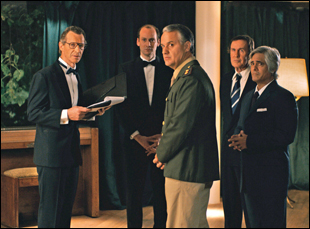
Yeah, the main aspect of the movie in terms of acting is very simple. It’s just to put two different personalities towards how one is eating the other, one is winning in terms of power, beating the other, so it was really important to me to bring a really professional actor like Fabrizio [Rongione], who is really good but he used to work with nonprofessional actors and is a very sensitive person, in front of a nonprofessional actor, but coming from those worlds we were going to. They were all bankers, business lawyers or oligarch, so this meeting was important to record and that’s what happened in the movie.
The environments come alive In surprising ways so much for the viewer in terms of what’s happening – is that feeling something you try to replicate for the actors on set?
I didn’t try to replicate it exactly for the actors. I just tried to bring them separately into the same point and just observe them, just being. Of course, we were working with the script, but the main thing was to bring the nonprofessional in his comfortable area — his area of power, and Fabrizio was always was uncomfortable because he was not Argentine — he’s speaking Spanish [in the film], but in reality he doesn’t speak Spanish. He doesn’t like to travel. He was without his little daughters, so he was in a situation of excessive tension and I just put this tension on set to give this opportunity.
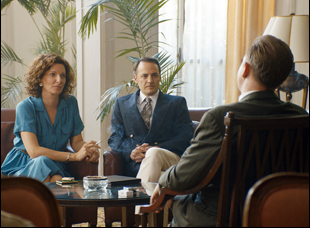
Yeah, we were working a lot with the sound designer and as the rest of the decisions I’d been making for the movie, I work in a minimalist way. So I convinced the sound designer to put the sound of the city into some scenes very quietly, like the [scenes by the] pool, it’s a garden and it seems to be tropical, we are in the middle of the city and in Buenos Aires, it’s very noisy, so this off-site presence was very important to build. Then you talk about silence, [which] for me, is one of the most effective tools to create tension. You can prove it in reality – when we are in front of somebody and don’t speak, the guy in front of us gets completely nervous because we love to create some words. We don’t like emptiness, so in cinema, I like a lot of silence in terms of the possibility of tension and submersion.
“Azor” will open on September 10th in New York at the IFC Center and September 17th at the Laemmle Royal, the Pasadena Playhouse and the Encino Town Center 5. A full list of theaters and dates is here.




